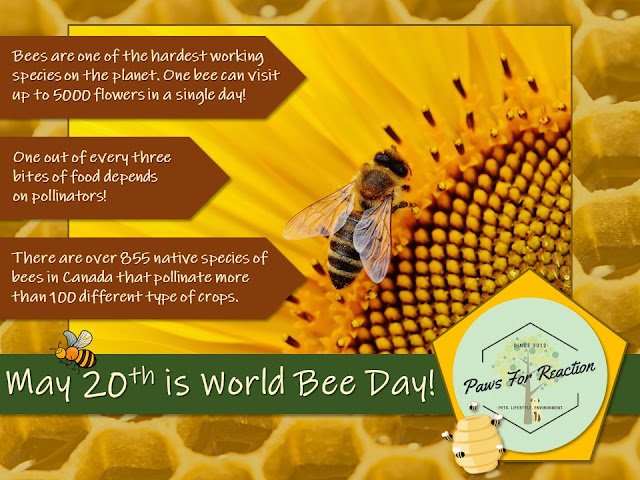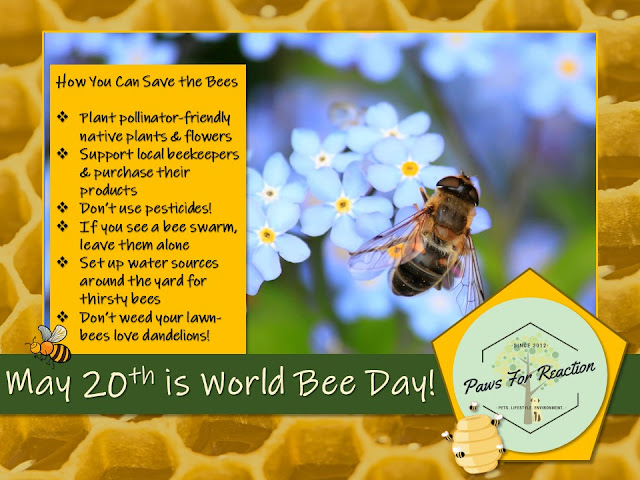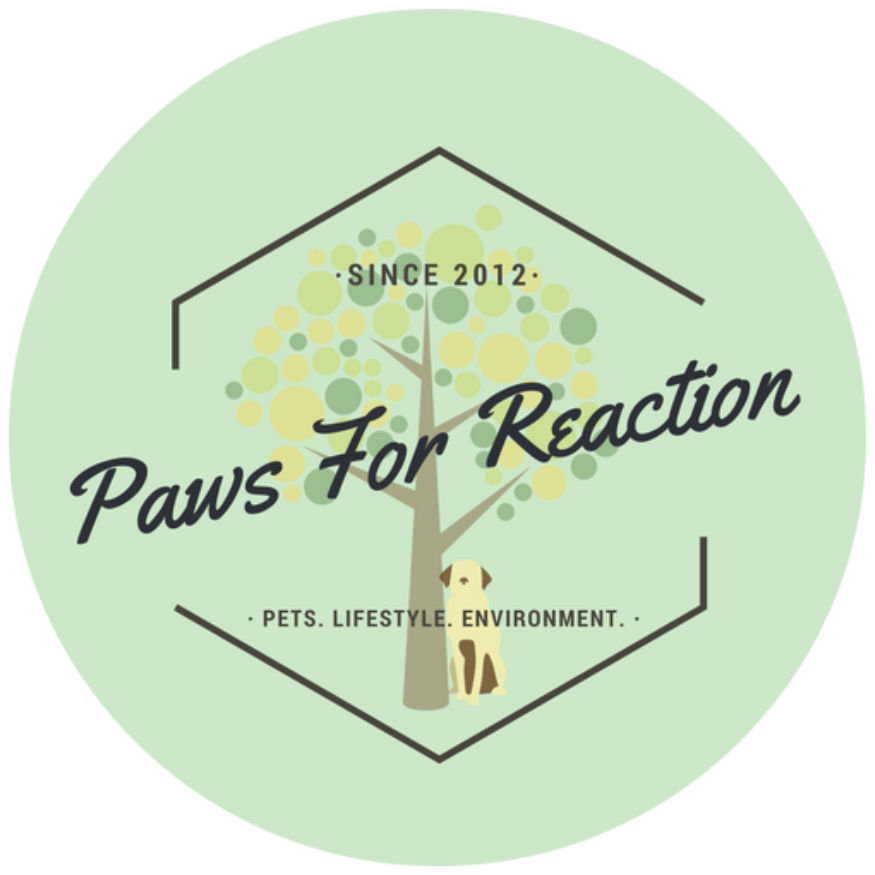World Bee Day: With bee populations at risk, how can you help protect the bees?
With murder hornets in the news, bees are all the buzz in 2020. Bees are important players in our eco-system. They're hardworking pollinators that have a huge impact on our food supply. Unfortunately, with biodiversity being compromised, bees are being threatened by human activity. The way we live is causing a decline in many bee species- but there are things we can do to change this.
The United Nations designated May 20th World Bee Day. The date was selected because it "coincides with the birthday of Anton Janša, who in the 18th century pioneered modern beekeeping techniques in his native Slovenia."
Why are bees important?
Bees are essential insects. They're pollinators and directly impact the fruit, vegetables, and other food we eat. Did you know that without bees we wouldn't have coffee or chocolate? Bees are the most common pollinators and contribute to our food diversity. Besides food, bee's pollination powers also contribute directly to medicines, biofuels, fibers like cotton and linen, and construction materials. Pollinators are crucial in creating a balanced and flourishing ecosystem and essential to providing the materials we need to maintain our lifestyle- the same lifestyle that is negatively impacting bee populations.
Bee populations in Canada and around the world are declining
Honey bees have been affected by Colony Collapse Disorder (CCD), one of nature's great mysteries. This is when the majority of worker bees in a colony abandon their queen. They disappear and leave her behind, along with lots of food and a few nurse bees to take care of the immature bees that are left. It's a phenomenon that scientists believe is the bee's response to threats to their environment. Loss of habitat, parasites, and pesticides are thought to be the reason why these bees are flying away. Neonicotinoid pesticides are specific pesticides that seem to be attacking pollinators.
Ontario relies on the Federal Government to regulate use of neonicotinoid pesticides in the province. If farmers want to use neonicotinoid-treated seeds they need to complete extensive training and pest risk assessments, as well as purchase their seeds from a licensed vendor. They also have to follow "legally-binding product labels provided by Health Canada’s Pest Management Regulatory Agency to ensure the use of neonicotinoid-treated seeds does not pose an unacceptable risk to human health or the environment."
Many scientists and environmentalists say it's not enough, and neonicotinoid-treated seeds should not be legal. In 2006 reports of honey bee population declining and disappearing started to surface. The Globe and Mail reported that honey bee Wintering losses were 28.6% in 2012-2013; 15% in 2011-2012; and 29% in 2010-2011.
What is being done to save the bees?
Because of the declining numbers, Canada has worked hard to protect the honey bee and rightfully so. The honey bee has a great impact on our economy. Bees have environmental and agricultural importance. According to Stats Canada, the number of honey bee colonies in Canada was down 2.1% from a year earlier to 773,182 in 2019, and honey production fell 15.4%.
Protecting the economy's favourite bee- the honey bee- is ideal and seems to be having an effect on current populations. The problem is that Canada has more than 800 species of native bees, and most of them are not getting the same attention as honey bees. Currently, there are three species of bees at risk in Ontario.
Climate change has an impact on bees as it directly impacts their environment. Climate change also affects the flora that bees pollinate and the viability of viruses they can contract. If we change the temperature of a bee's environment we stand to alter almost every aspect of their 'job' as pollinators. Science reported that climate change has contributed to the widespread decline of bumblebees across continents. "Climate change could increase species’ extinction risk as temperatures and precipitation begin to exceed species’ historically observed tolerances."
Canada's environmental legislation and climate action will have a positive impact on pollinator populations. Canada is taking action to reduce emissions and create more innovative green jobs to work toward a sustainable and cleaner future. Canada also has protected parks, marine conservations, and protected land- an area free of pesticides, agriculture, and the human footprint. It's a great start, but we need to do more. That's why it's so important that every citizen does their part to contribute to a livable habitat for pollinators.
How You Can Save the Bees
There are ways that you can help increase bee populations from your own backyard.
Local honey in Ottawa
Supporting a local apiary is a great way to give back to the bee community. Beekeepers do more than just produce honey- they also keep bee populations healthy and thriving. Instead of purchasing big-box honey, shop local. These are two local honey producers in Ottawa.
Gee Bees Honey Company: Located on River Road, Gee Bees was 'unofficially' founded in 2009 by a colony of honey bees that moved into the wall of the business owner's home. After rescuing the bees, they were bitten by the honey bug and now produce and sell their honey at their retail store and online.
Harvest Honey: Located on Stewart Street in Ottawa, these beekeepers work hard to promote education about the importance of honeybees in our global ecosystem. They sell unpasteurized honey at their location, or you can view their contact page to inquire about shipping honey directly to your home.
The best way to save bees is to raise awareness about declining bee populations and educate people about what they can do to save them. Share this post to create some buzz about the most powerful of all the pollinators: the bees!
 |
| This post contains affiliate links |
With murder hornets in the news, bees are all the buzz in 2020. Bees are important players in our eco-system. They're hardworking pollinators that have a huge impact on our food supply. Unfortunately, with biodiversity being compromised, bees are being threatened by human activity. The way we live is causing a decline in many bee species- but there are things we can do to change this.
The United Nations designated May 20th World Bee Day. The date was selected because it "coincides with the birthday of Anton Janša, who in the 18th century pioneered modern beekeeping techniques in his native Slovenia."
Why are bees important?
Bees are essential insects. They're pollinators and directly impact the fruit, vegetables, and other food we eat. Did you know that without bees we wouldn't have coffee or chocolate? Bees are the most common pollinators and contribute to our food diversity. Besides food, bee's pollination powers also contribute directly to medicines, biofuels, fibers like cotton and linen, and construction materials. Pollinators are crucial in creating a balanced and flourishing ecosystem and essential to providing the materials we need to maintain our lifestyle- the same lifestyle that is negatively impacting bee populations.
Bee populations in Canada and around the world are declining
Honey bees have been affected by Colony Collapse Disorder (CCD), one of nature's great mysteries. This is when the majority of worker bees in a colony abandon their queen. They disappear and leave her behind, along with lots of food and a few nurse bees to take care of the immature bees that are left. It's a phenomenon that scientists believe is the bee's response to threats to their environment. Loss of habitat, parasites, and pesticides are thought to be the reason why these bees are flying away. Neonicotinoid pesticides are specific pesticides that seem to be attacking pollinators.
Ontario relies on the Federal Government to regulate use of neonicotinoid pesticides in the province. If farmers want to use neonicotinoid-treated seeds they need to complete extensive training and pest risk assessments, as well as purchase their seeds from a licensed vendor. They also have to follow "legally-binding product labels provided by Health Canada’s Pest Management Regulatory Agency to ensure the use of neonicotinoid-treated seeds does not pose an unacceptable risk to human health or the environment."
Many scientists and environmentalists say it's not enough, and neonicotinoid-treated seeds should not be legal. In 2006 reports of honey bee population declining and disappearing started to surface. The Globe and Mail reported that honey bee Wintering losses were 28.6% in 2012-2013; 15% in 2011-2012; and 29% in 2010-2011.
What is being done to save the bees?
Because of the declining numbers, Canada has worked hard to protect the honey bee and rightfully so. The honey bee has a great impact on our economy. Bees have environmental and agricultural importance. According to Stats Canada, the number of honey bee colonies in Canada was down 2.1% from a year earlier to 773,182 in 2019, and honey production fell 15.4%.
Protecting the economy's favourite bee- the honey bee- is ideal and seems to be having an effect on current populations. The problem is that Canada has more than 800 species of native bees, and most of them are not getting the same attention as honey bees. Currently, there are three species of bees at risk in Ontario.
Climate change has an impact on bees as it directly impacts their environment. Climate change also affects the flora that bees pollinate and the viability of viruses they can contract. If we change the temperature of a bee's environment we stand to alter almost every aspect of their 'job' as pollinators. Science reported that climate change has contributed to the widespread decline of bumblebees across continents. "Climate change could increase species’ extinction risk as temperatures and precipitation begin to exceed species’ historically observed tolerances."
Canada's environmental legislation and climate action will have a positive impact on pollinator populations. Canada is taking action to reduce emissions and create more innovative green jobs to work toward a sustainable and cleaner future. Canada also has protected parks, marine conservations, and protected land- an area free of pesticides, agriculture, and the human footprint. It's a great start, but we need to do more. That's why it's so important that every citizen does their part to contribute to a livable habitat for pollinators.
How You Can Save the Bees
There are ways that you can help increase bee populations from your own backyard.
- Plant pollinator-friendly native plants and flowers
- Support local beekeepers and purchase their products
- Don’t use pesticides and don't buy products that use pesticide-seed: shop organic and non-GMO
- If you see a bee swarm, leave them alone- they will disband on their own
- Set up freshwater sources around the yard for thirsty bees
- We need flowers, vegetation, and gardens more than we need lawns- so plant a garden. You can even purchase a bee seed pack
- Don’t weed your lawn- bees love dandelions and other common weeds
- Adopt a worker bee!
Local honey in Ottawa
Supporting a local apiary is a great way to give back to the bee community. Beekeepers do more than just produce honey- they also keep bee populations healthy and thriving. Instead of purchasing big-box honey, shop local. These are two local honey producers in Ottawa.
Gee Bees Honey Company: Located on River Road, Gee Bees was 'unofficially' founded in 2009 by a colony of honey bees that moved into the wall of the business owner's home. After rescuing the bees, they were bitten by the honey bug and now produce and sell their honey at their retail store and online.
Harvest Honey: Located on Stewart Street in Ottawa, these beekeepers work hard to promote education about the importance of honeybees in our global ecosystem. They sell unpasteurized honey at their location, or you can view their contact page to inquire about shipping honey directly to your home.
The best way to save bees is to raise awareness about declining bee populations and educate people about what they can do to save them. Share this post to create some buzz about the most powerful of all the pollinators: the bees!
Give me a high paw and follow Paws For Reaction on Pinterest
Like Paws for Reaction on Facebook
Follow @PawsForReaction on Twitter
Follow @PawsForReaction on Instagram
Follow my blog and subscribe in the sidebar >>
bee
bees
biodiversity
Canada
climate change
honey
honey bee
Honey Bee Day
insects
May 20
murder hornet
Ontario
Ontario Nature
pesticides
pollinator
slider1. flowers
wildlife
World Bee Day
























1 Comentarios
Small contribution to your article in the form of drawings, French visual artist I produced a series on bee mortality by pollution from chemicals and pesticides used in agriculture. This series is presented at the Geneva Museum at the "Tout contre la Terre" exhibition from October 2021 to November 2022. To discover: https://1011-art.blogspot.com/p/vous-etes-ici.html
ReplyDeleteBut also in direct link "Hommage à Magritte": https://1011-art.blogspot.com/p/hommage-magritte.html